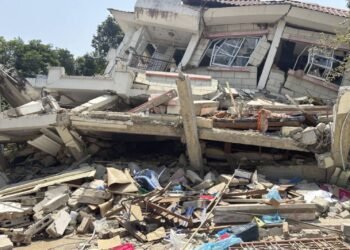MIRAMAR, Panama (news agencies) — Officials in Costa Rica and Panama are confiscating migrants’ passports and cellphones, denying them access to legal services and moving them between remote outposts as they wrestle with the logistics of a suddenly reversed migration flow.
The restrictions and lack of transparency are drawing criticism from human rights observers and generating increasingly testy responses from officials, who say their actions are aimed at protecting the migrants from human traffickers.
Both countries have received hundreds of deportees from various nations sent by the United States as President Donald Trump’s administration tries to accelerate deportations. At the same time, thousands of migrants shut out of the U.S. have started moving south through Central America – Panama recorded 2,200 so far in February.
“We’re a reflection of current United States immigration policy,” said Harold Villegas-Román, a political science professor and refugee expert at the University of Costa Rica. “There is no focus on human rights, there is only focus on control and security. Everything is very murky, and not transparent.”
Earlier this month, the U.S. sent 299 deportees from mostly Asian countries to Panama. Those who were willing to return to their countries – about 150 to date — were put on planes with the assistance of United Nations agencies and paid for by the U.S.
Carlos Ruiz-Hernandez, Panama’s deputy foreign minister, said Thursday a small number are in contact with international organizations and the U.N. Refugee Agency as they weigh whether to seek asylum in Panama.
“None of them wants to stay in Panama. They want to go to the U.S.,” he said in a phone interview from Washington. “We cannot give them green cards, but we can get them back home and for a short period of time provide them with medical and psychological support as well as housing.”
Despite Trump’s threats to retake control of the Panama Canal, he said Panama had not acted under U.S. pressure. “This is in Panama’s national interest. We are a friend of the U.S. and want to work with them to send a signal of deterrence.”
Ruiz-Hernandez said some of the deportees remaining in Panama would be given the option of staying at a shelter originally set up to handle the large number of migrants moving north through the Darien Gap.
One Chinese deportee currently detained in the camp, who spoke on the condition of anonymity to avoid repercussions, said she wasn’t given a choice.
She was deported to Panama without knowing where they were being sent, without signing deportation documents in the U.S. and without clarity of how long they would be there. She was among the deportees who were moved from a Panama City hotel where some held up signs to their windows asking for help to a remote camp in the Darien region.
Speaking to the news agencies over messages on a cellphone she kept hidden, she said authorities confiscated others’ phones and offered them no legal assistance. Others have said they’ve been unable to contact their lawyers.
“This deprived us of our legal process,” she said.
Panama President José Raúl Mulino, asked about the lack of access to legal services on Thursday, questioned the idea that migrants would even have lawyers.
“Doesn’t it seem like a coincidence that those poor people have lawyers in Panama?” Mulino said.
Costa Rica and Panama have so far denied press access to facilities where they are holding migrants. Panama had initially invited journalists to the Darien this week, but ultimately canceled the visit.
“Panama cannot end up becoming a black hole for deported migrants,” said Juan Pappier, deputy director of Human Rights Watch in the Americas. “Migrants have the right to communicate with their families, to seek lawyers and Panama must guarantee transparency about the situation in which they find themselves.”
Costa Rica has faced similar criticisms from the country’s independent human rights entity, which has raised alarm over “failures” by authorities to guarantee proper conditions for deportees arriving. The Ombudsman’s Office, said that migrants were also stripped of their passports and other documents, and were not informed about what was happening or where they were going.
Panama and Costa Rica, long transit countries for people migrating north, have scrambled to address the new flow of migrants going south and organize the flow.
Kimberlyn Pereira, a 27-year-old Venezuelan traveling with her husband and 4-year-old son was among them.








 United Arab Emirates Dirham Exchange Rate
United Arab Emirates Dirham Exchange Rate

